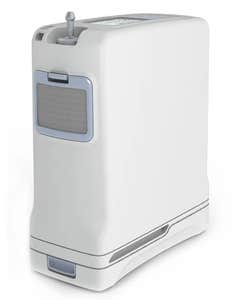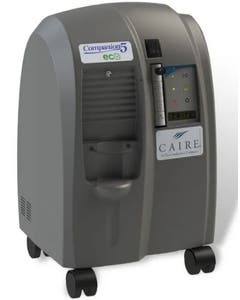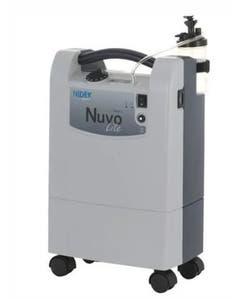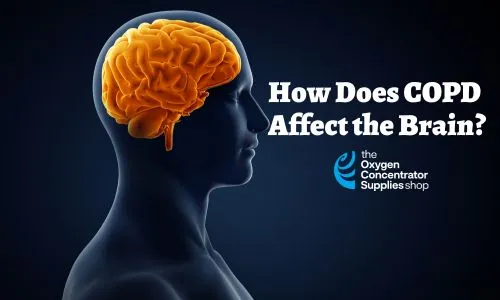
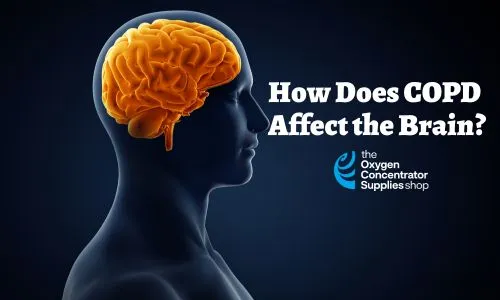
Chronic obstructive pulmonary disease (COPD) does more than affect the lungs. COPD can impact other areas of the body including the heart and the brain. Oxygen plays such an important role in our bodily well-being that decreases in blood oxygen saturation can be detrimental to our mental health as well as our physical health. COPD can affect the brain as it is linked to a higher risk of memory loss or memory problems.
What Is COPD?
COPD or chronic obstructive pulmonary disease is a group of lung illnesses that reduce airflow and breathing. COPD includes other respiratory diseases such as emphysema and chronic bronchitis. Over 16 million Americans are affected by COPD. While some instances of COPD are genetic in origin, the majority of cases are caused by inhaled pollutants over time. Smoking and breathing consistently in polluted environments such as a toxic industrial work settings can all lead to COPD later in life.
Signs and Symptoms of COPD
The telltale signs and symptoms of COPD are the persistent cough that gradually gets worse and produces more mucus as the disease progresses. Difficulty breathing is one of the most debilitating symptoms, leading to chronic fatigue. At later stages more frequent colds, swelling of the ankles and feet, and tightness in the chest are indicators that the disease is worsening.
What Does COPD Do to the Brain?
Because COPD reduces oxygen flow throughout the body, it also means reduced oxygen to the brain. Over time, low levels of oxygen can begin to cause brain damage. Patients with COPD who are experiencing neural decay may start having memory problems, similar to dementia. The affects of low oxygen can also negatively affect certain part of the brain as well.
Link Between COPD and Neurological Problems
Low-levels of oxygen in the blood can affect the parts of our brain that manage fear, sleep, and breathing. The long-term effects of chronic COPD can lead to serious neurological problems such as dementia, sleep disorders, Parkinson’s disease, epilepsy, and stroke. The importance of managing COPD with effective oxygen therapy helps prevent long-term neurological disorders from affecting patients in the future.
Impact of COPD on the Brain
As the brain continues to exist in an oxygen-starved state, it begins to degrade. Functioning on unhealthy low levels of oxygen causes parts of the brain to decay, which can contribute to an early death. As the brain decays, emotional and mental health become compromised. Often because COPD can be an affliction of older patients, diseases such as dementia and Parkinson’s disease are assumed to be related to advanced age rather than low oxygen flow to the brain.
How Does COPD Cause Structural Changes in the Brain?
Patients with long-term COPD begin to see a decrease in brain gray matter. These areas of the brain control fear and sensitivity to pain and breathlessness. As COPD patients lose this essential gray matter in the hippocampus and amygdala, they become even more out of breath, more anxious and more reactionary to even minor pain. Patients became more fearful of physical activity as they became more hypersensitive.
Other Ways That COPD Can Affect the Brain
With degraded gray matter, a person with COPD begins to experience the world with greater hesitation and worry. Patients with both COPD and increasing brain damage may begin to withdrawal from their surroundings and become personally isolated. These emotional reactions can further drive brain decay. With a better understanding of how COPD affects the brain a patient of COPD can take proper measures to help prevent brain decay through effective oxygen therapy.
Summary
The first step to proper treatment is to speak with your doctor. Make sure your blood oxygen saturation levels are at a healthy number. Blood oxygen saturation can even be measured at home with a pulse oximeter. When levels drop, be sure to rely on your oxygen concentrator for breathing support. Even if you do not feel breathless, an oxygen concentrator can help raise blood oxygen levels to help the brain receive essential oxygen so you can live better with COPD.
This post was originally published on June 7, 2022 and updated on January 11, 2024.




